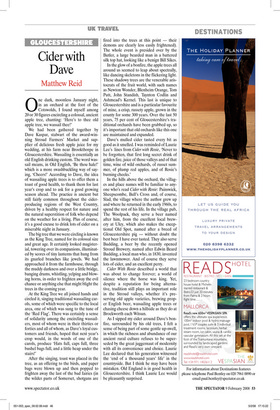Cider with Dave
Matthew Reid
One dark, moonless January night, in an orchard at the foot of the Cotswolds, I found myself among 20 or 30 figures encircling a colossal, ancient apple tree, chanting: ‘Here’s to thee old apple tree, we wassail thee!’ We had been gathered together by Dave Kaspar, stalwart of the award-winning Stroud Farmers’ Market and supplier of delicious fresh apple juice for my wedding, at his farm near Brookthorpe in Gloucestershire. Wassailing is essentially an old English drinking custom. The word wassail means, in Old English, ‘Be thou hale!’ which is a more swashbuckling way of saying, ‘Cheers!’ According to Dave, the idea of wassailing apple trees is to offer them a toast of good health, to thank them for last year’s crop and to ask for a good growing season ahead. The practice is ancient but still fairly common throughout the ciderproducing regions of the West Country, driven by a healthy respect for nature and the natural superstition of folk who depend on the weather for a living. Plus of course, it’s a good excuse to drink lots of cider on a miserable night in January.
The big tree that we were circling is known as the King Tree, named for its colossal size and great age. It certainly looked magisterial, towering over its companions, illuminated by scores of tiny lanterns that hung from its gnarled branches like jewels. We had approached it from the farmhouse, through the muddy darkness and over a little bridge, banging drums, whistling, yelping and blowing horns, in order to frighten away the evil chance or anything else that might blight the trees in the coming year.
At the King Tree we all joined hands and circled it, singing traditional wassailing carols, some of which were specific to the local area, one of which was sung to the tune of the ‘Red Flag’. There was certainly a sense of solidarity among the encircling wassailers, most of whom were in their thirties or forties and all of whom, as Dave’s loyal customers and friends, hoped that next year’s crop would, in the words of one of the carols, produce ‘Hats full, caps full, three bushel bags full, and a little heap under the stairs!’ After the singing, toast was placed in the tree, as an offering to the birds, and paper bags were blown up and then popped to frighten away the last of the bad fairies (in the wilder parts of Somerset, shotguns are fired into the trees at this point — their demons are clearly less easily frightened). The whole event is presided over by the Butler, a large bearded man in a battered silk top hat, looking like a benign Bill Sikes.
In the glow of a bonfire, the apple trees all around us seemed to leap about spectrally, like dancing skeletons in the flickering light. These shadowy trees are the venerable aristocrats of the fruit world, with such names as Newton Wonder, Blenheim Orange, Tom Putt, John Standish, Taynton Codlin and Ashmead’s Kernel. This last is unique to Gloucestershire and is a particular favourite of mine, a crisp, russety apple, grown in the county for some 300 years. Over the last 50 years, 75 per cent of Gloucestershire’s traditional orchards have been grubbed up, so it’s important that old orchards like this one are maintained and expanded.
Dave’s mulled cider tasted every bit as good as it smelled. I was reminded of Laurie Lee’s lines from Cider with Rosie, ‘Never to be forgotten, that first long secret drink of golden fire, juice of those valleys and of that time, wine of wild orchards, of russet summer, of plump red apples, and of Rosie’s burning cheeks.’ In the hills above the orchard, the villages and place names will be familiar to anyone who’s read Cider with Rosie: Painswick, Sheepscombe, Bull’s Cross and, of course, Slad, the village where the author grew up and where he returned in the early 1960s, to spend the rest of his life. In the village pub, The Woolpack, they serve a beer named after him, from the excellent local brewery at Uley, which also makes the exceptional Old Spot, named after a breed of Gloucestershire pig — without doubt the best beer I have ever tasted. They also serve Budding, a beer by the recently opened Stroud Brewery, named after Edwin Beard Budding, a local man who, in 1830, invented the lawnmower. And of course they serve lots of cider, and an excellent perry.
Cider With Rosie described a world that was about to change forever; a world of silence where the horse was king. Yet, despite a reputation for being alternative, tradition still plays an important role in the Stroud valleys, whether it’s preserving old apple varieties, brewing proper English beer, wassailing apple trees or chasing cheese down a hillside as they do at Brockworth each Witsun.
As I sipped my cider around Dave’s bonfire, surrounded by his old trees, I felt a sense of being part of some gentle up-swell, in which the richness and abundance of our ancient rural culture refuses to be superseded by the great juggernaut of modernity with all its convenience and choice. Laurie Lee declared that his generation witnessed the ‘end of a thousand years’ life’ in the countryside. But I think he may have been mistaken. Old England is in good health in Gloucestershire. I think Laurie Lee would be pleasantly surprised.


































































 Previous page
Previous page